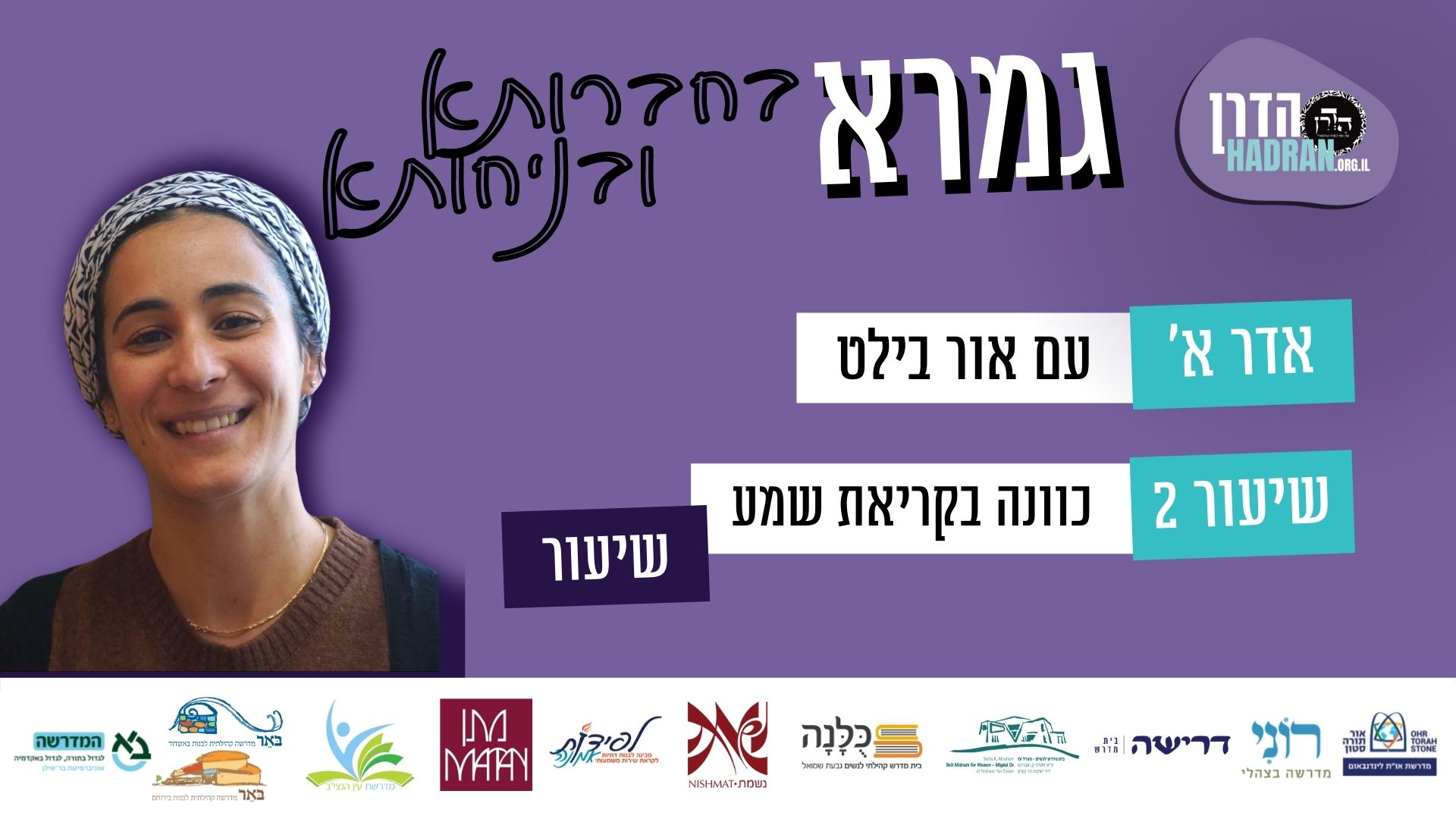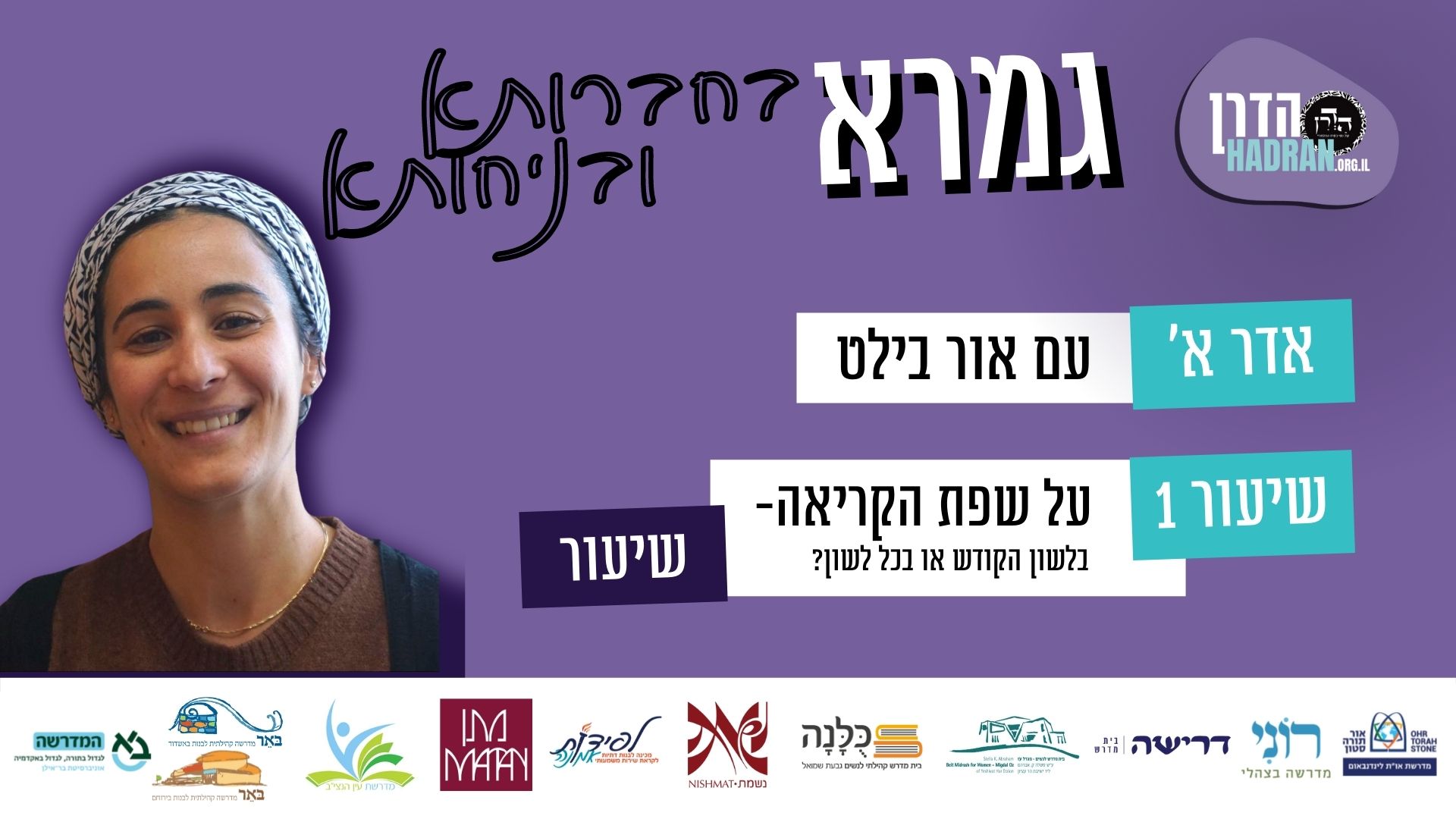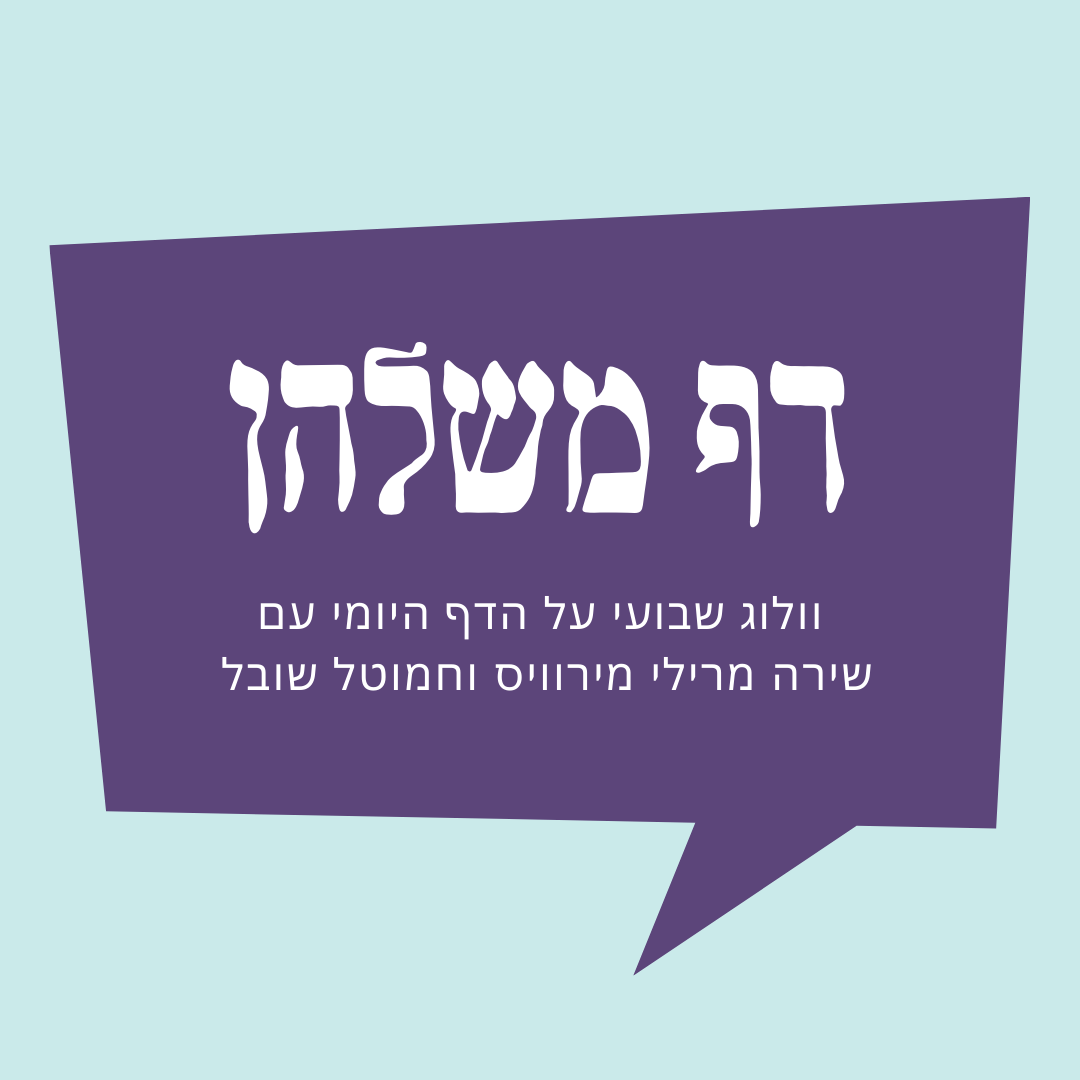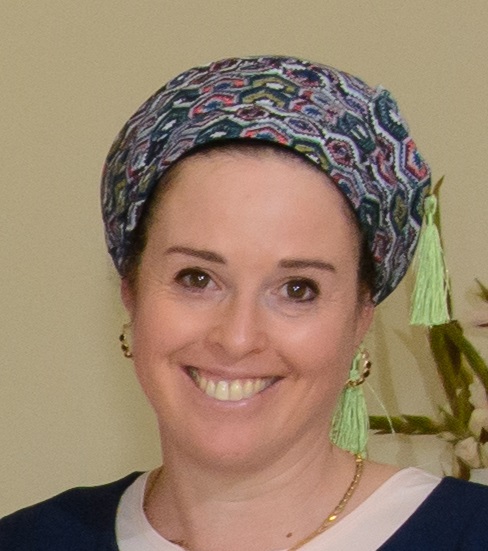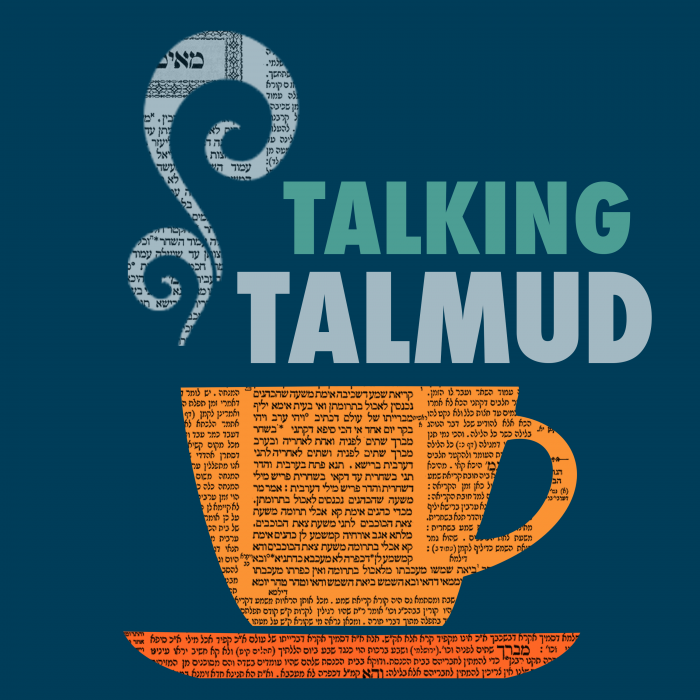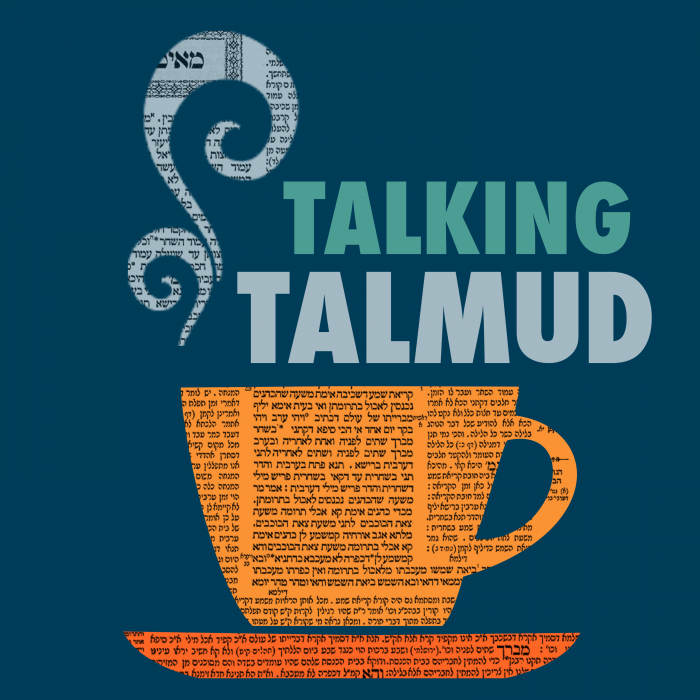מהמלים בשבתך בביתך ובלכתך בדרך דורשים שהעוסק במצוה וחתן פטור מקריאת שמע. החתן פטור בגלל שטרוד במצוה. האם זה אומר שכל מי שטרוד פטור מקריאת שמע? אבל חייב בכל המצוות חוץ מתפילין. האם אפשר לפסוק כבית שמאי ולהטות בזמן קריאת שמע של ערבית ולעמוד בשחרית? יש דעות שונות בעניין. מהן הברכות לפני קריאת שמע של שחרית? על איזה סוג לימוד צריך לברך ברכות התורה? מה נוסח הברכה? מסופר במסכת תמיד שהכהנים ברכו ברכה אחת לפני קריאת שמע – איזה ברכה?
רוצה להקדיש שיעור?
כלים
העמקה
רוצה להבין מה באמת קורה מתחת לפני השטח של הסוגיה?
שיעורים, פודקאסטים והרחבות של מיטב המורות שלנו יפתחו לך עוד זוויות וכיווני חשיבה.
חדשה בלימוד הגמרא?
זה הדף הראשון שלך? איזו התרגשות עצומה! יש לנו בדיוק את התכנים והכלים שיעזרו לך לעשות את הצעדים הראשונים ללמידה בקצב וברמה שלך, כך תוכלי להרגיש בנוח גם בתוך הסוגיות המורכבות ומאתגרות.
פסיפס הלומדות שלנו
גלי את קהילת הלומדות שלנו, מגוון נשים, רקעים וסיפורים. כולן חלק מתנועה ומסע מרגש ועוצמתי.
ברכות יא
גְּמָ׳ בִּשְׁלָמָא בֵּית הִלֵּל — קָא מְפָרְשִׁי טַעְמַיְיהוּ וְטַעְמָא דְּבֵית שַׁמַּאי, אֶלָּא בֵּית שַׁמַּאי — מַאי טַעְמָא לָא אָמְרִי כְּבֵית הִלֵּל?
GEMARA: The Gemara begins by clarifying the rationale for Beit Shammai’s opinion. Granted, Beit Hillel explain the rationale for their opinion and the rationale for Beit Shammai’s opinion. Beit Hillel explain both the verse that ostensibly supports Beit Shammai’s opinion: When you lie down, at the time when people lie down, etc., and the verse that proves that their own explanation is more reasonable: “And when you walk along the way.” However, what is the reason that Beit Shammai do not state their opinion in accordance with the opinion of Beit Hillel?
אָמְרִי לָךְ בֵּית שַׁמַּאי: אִם כֵּן, נֵימָא קְרָא ״בַּבֹּקֶר וּבָעֶרֶב״, מַאי ״בְּשָׁכְבְּךָ וּבְקוּמֶךָ״? בִּשְׁעַת שְׁכִיבָה — שְׁכִיבָה מַמָּשׁ, וּבִשְׁעַת קִימָה — קִימָה מַמָּשׁ.
The Gemara answers, Beit Shammai could have said to you: If so that the verse means only to denote the time for the recitation of Shema, as claimed by Beit Hillel, then let the verse say: “In the morning and in the evening.” What is the meaning of the ambiguous formulation: “When you lie down, and when you rise”? It must mean that at the time of lying down one must recite Shema while actually lying down, and at the time of arising one must recite Shema while actually risen.
וּבֵית שַׁמַּאי: הַאי ״וּבְלֶכְתְּךָ בַדֶּרֶךְ״, מַאי עֲבִיד לְהוּ?
The Gemara continues, asking: And what do Beit Shammai do with this verse: “And when you walk along the way,” which Beit Hillel use to prove that every person recites Shema as he is?
הָהוּא מִבְּעֵי לְהוּ, לְכִדְתַנְיָא: ״בְּשִׁבְתְּךָ בְּבֵיתֶךָ״ — פְּרָט לְעוֹסֵק בְּמִצְוָה, ״וּבְלֶכְתְּךָ בַדֶּרֶךְ״ — פְּרָט לְחָתָן. מִכָּאן, אָמְרוּ: הַכּוֹנֵס אֶת הַבְּתוּלָה — פָּטוּר, וְאֶת הָאַלְמָנָה — חַיָּיב.
The Gemara answers: Beit Shammai need this verse in order to derive other halakhot, as it was taught in a baraita which interpreted this verse that the obligation to recite Shema applies when you sit in your home, to the exclusion of one who is engaged in performance of a mitzva, who is exempt from the recitation of Shema; and when you walk along the way, to the exclusion of a groom, who is also exempt from the recitation of Shema. The baraita adds that from here, from this interpretation of the verses, they said: One who marries a virgin is exempt from the recitation of Shema on his wedding night, but one who marries a widow is obligated.
מַאי מַשְׁמַע?
The Gemara clarifies the meaning of this baraita, and asks: From where may it be inferred that the verse, when you walk along the way, exempts a groom from the obligation to recite Shema?
אָמַר רַב פָּפָּא: כִּי דֶרֶךְ. מָה דֶּרֶךְ רְשׁוּת, אַף כֹּל רְשׁוּת.
Rav Pappa said that we learn: Like the way; just as the journey along a specific way described in the verse is voluntary and involves no mitzva, so too all of those who are obligated to recite Shema are engaged in voluntary activities. However, one engaged in the performance of a mitzva, like a groom, is exempt from the obligation to recite Shema.
מִי לָא עָסְקִינַן דְּקָא אָזֵיל לִדְבַר מִצְוָה, וַאֲפִילּוּ הָכִי אָמַר רַחֲמָנָא: לִקְרֵי. אִם כֵּן לִכְתּוֹב רַחֲמָנָא ״בְּשֶׁבֶת וּבְלֶכֶת״ מַאי ״בְּשִׁבְתְּךָ וּבְלֶכְתְּךָ״? — בְּשֶׁבֶת דִּידָךְ וּבְלֶכֶת דִּידָךְ הוּא דְּמִחַיְּיבַתְּ, הָא דְּמִצְוָה פְּטִירַתְּ.
The Gemara asks: Are we not dealing with a case where one walks along the way to perform a mitzva? The Torah did not designate the objective of his walk and, nevertheless, the Torah said to recite Shema, indicating that one is obligated even if he set out to perform a mitzva. Rather, the proof is from the formulation of the verse. If so, that the intention was to obligate in all cases, let the Torah write: When sitting and when walking. What is the meaning of: When you sit and when you walk? Certainly these additions come to emphasize in your sitting down and in your walking, meaning that when one does this for his own purposes and of his own volition, he is obligated to recite Shema, but when he does with the objective of performing a mitzva, he is exempt from reciting Shema, as in that case he is sitting or walking at God’s behest.
אִי הָכִי אֲפִילּוּ כּוֹנֵס אֶת הָאַלְמָנָה נָמֵי?
The conclusion is that anyone engaged in the performance of a mitzva is exempt from the recitation of Shema. If so, even one who marries a widow should be exempt, for he, too, is engaged in performance of a mitzva. That, however, contradicts the baraita.
הַאי טְרִיד, וְהַאי לָא טְרִיד.
The Gemara responds that there is nevertheless a distinction between one marrying a virgin and one marrying a widow. One who marries a virgin is preoccupied by his concern lest he discover that his bride is not a virgin, while one who marries a widow is not preoccupied. The conclusion is that the groom is exempt from reciting Shema because he is preoccupied.
אִי מִשּׁוּם טִרְדָּא, אֲפִילּוּ טָבְעָה סְפִינָתוֹ בַּיָּם נָמֵי! וְכִי תֵּימָא: הָכִי נָמֵי, אַלְּמָה אָמַר רַבִּי אַבָּא בַּר זַבְדָּא אָמַר רַב: אָבֵל חַיָּיב בְּכָל הַמִּצְוֹת הָאֲמוּרוֹת בַּתּוֹרָה, חוּץ מִן הַתְּפִילִּין, שֶׁהֲרֵי נֶאֱמַר בָּהֶם ״פְּאֵר״, שֶׁנֶּאֱמַר: ״פְּאֵרְךָ חֲבוֹשׁ עָלֶיךָ״?!
The Gemara asks: If the exemption is due to preoccupation, then even one who is preoccupied because his ship sank at sea should also be exempt. The Gemara reinforces its question: And if you say that in this case as well, when one’s ship sank at sea, one is exempt, why then did Rabbi Abba bar Zavda say that Rav said: A mourner is obligated in all the mitzvot mentioned in the Torah except for the mitzva to don phylacteries, from which a mourner is exempt, as the term splendor is stated with regard to phylacteries, as it is stated: “Make no mourning for the dead, bind your splendor upon yourself” (Ezekiel 24:17). It is inappropriate for a mourner to wrap himself in phylacteries, with regard to which, the term splendor was employed (Tosafot). If a mourner, who is clearly pained and preoccupied, is obligated to recite Shema, then certainly all others who are preoccupied, even one whose ship sank at sea, whose loss was merely monetary (Birkat Hashem), should be obligated. Why, then, is a groom exempted because of his preoccupation and one who lost his property is not?
הָתָם טְרִיד טִרְדָּא דְמִצְוָה, הָכָא טְרִיד טִרְדָּא דִרְשׁוּת.
The Gemara answers: Nevertheless, there is a distinction between the cases. For there, in the case of a groom, he is preoccupied with the preoccupation of a mitzva that he must perform; here, in the case of a ship lost at sea, he is preoccupied with the preoccupation of a voluntary act that he chooses to perform.
Here, the Gemara returns to its initial question: And how do Beit Shammai explain the passage: “When you walk along the way” (Rashash)?
הָהוּא מִבְּעֵי לְהוּ — פְּרָט לִשְׁלוּחֵי מִצְוָה.
The Gemara answers: Beit Shammai need this passage in order to exclude one who is on the path to perform a mitzva from the obligation to recite Shema.
וּבֵית הִלֵּל אָמְרִי: מִמֵּילָא שְׁמַע מִינַּהּ דַּאֲפִילּוּ בַדֶּרֶךְ נָמֵי קָרֵי.
Beit Hillel also agree that one engaged in the performance of a mitzva is exempt from reciting Shema? If so, the halakha that they derived from: When you walk along the way lacks a source and is therefore unfounded. And Beit Hillel say: Derive from this halakha itself that one who is not an agent in the performance of a mitzva recites Shema even along the way.
תָּנוּ רַבָּנַן, בֵּית הִלֵּל אוֹמְרִים: עוֹמְדִין וְקוֹרִין, יוֹשְׁבִין וְקוֹרִין, וּמַטִּין וְקוֹרִין, הוֹלְכִין בַּדֶּרֶךְ וְקוֹרִין, עוֹשִׂין בִּמְלַאכְתָּן וְקוֹרִין. וּמַעֲשֶׂה בְּרַבִּי יִשְׁמָעֵאל וְרַבִּי אֶלְעָזָר בֶּן עֲזַרְיָה, שֶׁהָיוּ מְסוּבִּין בְּמָקוֹם אֶחָד, וְהָיָה רַבִּי יִשְׁמָעֵאל מוּטֶּה, וְרַבִּי אֶלְעָזָר בֶּן עֲזַרְיָה זָקוּף. כֵּיוָן שֶׁהִגִּיעַ זְמַן קְרִיאַת שְׁמַע, הִטָּה רַבִּי אֶלְעָזָר וְזָקַף רַבִּי יִשְׁמָעֵאל. אָמַר לוֹ רַבִּי אֶלְעָזָר בֶּן עֲזַרְיָה לְרַבִּי יִשְׁמָעֵאל: יִשְׁמָעֵאל אָחִי, אֶמְשׁוֹל לְךָ מָשָׁל לְמָה הַדָּבָר דּוֹמֶה — מָשָׁל לְאֶחָד שֶׁאוֹמְרִים לוֹ זְקָנְךָ מְגוּדָּל! אָמַר לָהֶם: יִהְיֶה כְּנֶגֶד הַמַּשְׁחִיתִים. אַף כָּךְ אַתָּה, כָּל זְמַן שֶׁאֲנִי זָקוּף — אַתָּה מוּטֶּה, עַכְשָׁיו כְּשֶׁאֲנִי הִטֵּתִי אַתָּה זָקַפְתָּ.
The Sages taught in a baraita that Beit Hillel say: One may recite Shema in any situation: Standing and reciting, sitting and reciting, reclining and reciting, walking and reciting and even working and reciting. And in the Tosefta an incident is related where two tanna’im, Rabbi Yishmael and Rabbi Elazar ben Azarya, who were both disciples of Beit Hillel, were reclining at a meal in one place together with their students, and Rabbi Yishmael was reclined as was the customary dining position, and Rabbi Elazar ben Azarya was upright. When the time to recite the evening Shema arrived, Rabbi Elazar reclined to recite Shema in accordance with the opinion of Beit Shammai, while Rabbi Yishmael sat upright to recite Shema. Rabbi Elazar ben Azarya appeared to take offense, and said to Rabbi Yishmael: Yishmael, my brother, I will tell you a parable to which this is similar. It is comparable to a situation where one to whom people say as a compliment: Your beard is full and suits you. That man says to them: May it be against those who shave and destroy their beards, i.e., the only reason I grow my beard is to irritate those who cut their own (Rashba). You are the same. As long as I am upright, you are reclined, and now when I reclined lauding your conduct and emulating you, you sat upright as if to demonstrate that whatever I do, you do the opposite.
אָמַר לוֹ: אֲנִי עָשִׂיתִי כְּדִבְרֵי בֵּית הִלֵּל, וְאַתָּה עָשִׂיתָ כְּדִבְרֵי בֵּית שַׁמַּאי. וְלֹא עוֹד אֶלָּא שֶׁמָּא יִרְאוּ הַתַּלְמִידִים וְיִקְבְּעוּ הֲלָכָה לְדוֹרוֹת.
Rabbi Yishmael said to him: I acted in accordance with the opinion of Beit Hillel, according to whom one may recite Shema in any position, while you acted in accordance with the opinion of Beit Shammai. I am the one who acted in accordance with the halakha. And furthermore, I was concerned lest the students see your conduct and establish the halakha for generations accordingly. It was therefore necessary for me to demonstrate that there is no obligation to do so.
מַאי ״וְלֹא עוֹד״?
The Gemara asks: What is the meaning of: And furthermore? Why was it necessary for Rabbi Yishmael to add additional justification for his actions when the reason that he acted in accordance with the opinion of Beit Hillel was sufficient?
וְכִי תֵּימָא: בֵּית הִלֵּל נָמֵי אִית לְהוּ מַטִּין, הָנֵי מִילֵּי דְּמַטֵּה וַאֲתָא מֵעִיקָּרָא. אֲבָל הָכָא, כֵּיוָן דְּעַד הַשְׁתָּא הֲוֵית זָקוּף וְהַשְׁתָּא מוּטֶּה, אָמְרִי: שְׁמַע מִינַּהּ כְּבֵית שַׁמַּאי סְבִירָא לְהוּ, שֶׁמָּא יִרְאוּ הַתַּלְמִידִים וְיִקְבְּעוּ הֲלָכָה לְדוֹרוֹת.
The Gemara answers: It was necessary for him to add this reason, as if you say: Beit Hillel also hold that one is permitted to recite Shema while reclining and Rabbi Yishmael could have remained reclining even in accordance with the opinion of Beit Hillel, but this only applies when one had already been reclining originally, in which case it is like any other position. However, here, since until now he had been upright, and now he is reclined, the students will say: Conclude from this, that they hold in accordance with the opinion of Beit Shammai. Due to the concern that the students might see and establish the halakha for generations in accordance with the opinion of Beit Shammai, it was necessary for Rabbi Yishmael to sit upright.
תָּנֵי רַב יְחֶזְקֵאל: עָשָׂה כְּדִבְרֵי בֵּית שַׁמַּאי — עָשָׂה, כְּדִבְרֵי בֵּית הִלֵּל — עָשָׂה.
Rav Yeḥezkel taught: One who acted in accordance with the opinion of Beit Shammai has acted appropriately and is not in violation of the halakha. One who acted in accordance with the opinion of Beit Hillel acted appropriately as well. According to this opinion, Beit Hillel and Beit Shammai agree that one who acted in accordance with the opinion of the other fulfilled his obligation. Although the halakha was ruled in accordance with the opinion of Beit Hillel, Beit Hillel would agree that one who acted in accordance with the opinion of Beit Shammai fulfilled his obligation.
רַב יוֹסֵף אָמַר: עָשָׂה כְּדִבְרֵי בֵּית שַׁמַּאי — לֹא עָשָׂה וְלֹא כְלוּם. דִּתְנַן: מִי שֶׁהָיָה רֹאשׁוֹ וְרוּבּוֹ בַּסּוּכָּה וְשֻׁלְחָנוֹ בְּתוֹךְ הַבַּיִת, בֵּית שַׁמַּאי פּוֹסְלִין, וּבֵית הִלֵּל מַכְשִׁירִין.
However, Rav Yosef said: One who acts in accordance with the opinion of Beit Shammai has done nothing and must repeat Shema in accordance with the opinion of Beit Hillel, as we learned in the mishna with regard to the halakhot of a sukka: One who had his head and most of his body in the sukka, and his table upon which he was eating inside the house, Beit Shammai invalidate his action, as he is liable to be drawn after the table and end up eating outside the sukka. And Beit Hillel validate his action, since his head and most of his body remain inside the sukka.
אָמְרוּ לָהֶם בֵּית הִלֵּל לְבֵית שַׁמַּאי: מַעֲשֶׂה שֶׁהָלְכוּ זִקְנֵי בֵּית שַׁמַּאי וְזִקְנֵי בֵּית הִלֵּל לְבַקֵּר אֶת רַבִּי יוֹחָנָן בֶּן הַחוֹרָנִית, מְצָאוּהוּ שֶׁהָיָה רֹאשׁוֹ וְרוּבּוֹ בַּסּוּכָּה וְשֻׁלְחָנוֹ בְּתוֹךְ הַבַּיִת, וְלֹא אָמְרוּ לוֹ כְּלוּם.
Beit Hillel said to Beit Shammai as a proof: There was an incident where the elders of Beit Shammai and the elders of Beit Hillel went on Sukkot to visit Rabbi Yoḥanan ben HaḤoranit. They found him with his head and most of his body in the sukka and his table inside the house and they said nothing to him. In other words, even Beit Shammai did not object.
אָמְרוּ לָהֶם: וּמִשָּׁם רְאָיָה?! אַף הֵם אָמְרוּ לוֹ: אִם כֵּן הָיִיתָ נוֹהֵג לֹא קִייַּמְתָּ מִצְוַת סוּכָּה מִיָּמֶיךָ.
Beit Shammai said to them: And is there proof from there? That is not what happened, rather they said to him explicitly: If you have been accustomed to act in this manner, you have never in your life fulfilled the mitzva of sukka. We see that Beit Shammai held that anyone who did not act in accordance with their opinion, did not fulfill his obligation at all. Similarly, since Beit Hillel’s opinion was accepted as halakha, anyone who acts in accordance with the opinion of Beit Shammai fails to fulfill his obligation.
רַב נַחְמָן בַּר יִצְחָק אָמַר: עָשָׂה כְּדִבְרֵי בֵּית שַׁמַּאי — חַיָּיב מִיתָה. דִּתְנַן, אָמַר רַבִּי טַרְפוֹן: אֲנִי הָיִיתִי בָּא בַּדֶּרֶךְ וְהִטֵּתִי לִקְרוֹת כְּדִבְרֵי בֵּית שַׁמַּאי וְסִכַּנְתִּי בְּעַצְמִי מִפְּנֵי הַלִּסְטִים, אָמְרוּ לוֹ: כְּדַאי הָיִיתָ לָחוּב בְּעַצְמְךָ, שֶׁעָבַרְתָּ עַל דִּבְרֵי בֵּית הִלֵּל.
Rav Naḥman bar Yitzḥak stated an even more extreme opinion: One who acted in accordance with the opinion of Beit Shammai has acted so egregiously that he is liable to receive the death penalty, as we learned in our mishna that Rabbi Tarfon said to his colleagues: Once, I was coming on the road when I stopped and reclined to recite Shema in accordance with the statement of Beit Shammai. Yet in so doing, I endangered myself due to the highwaymen who accost travelers. The Sages said to him: You deserved to be in a position where you were liable to pay with your life, as you transgressed the statement of Beit Hillel.
מַתְנִי׳ בַּשַּׁחַר מְבָרֵךְ שְׁתַּיִם לְפָנֶיהָ וְאַחַת לְאַחֲרֶיהָ. וּבָעֶרֶב מְבָרֵךְ שְׁתַּיִם לְפָנֶיהָ וּשְׁתַּיִם לְאַחֲרֶיהָ. אַחַת אֲרוּכָּה וְאַחַת קְצָרָה.
MISHNA: From the laws of the recitation of Shema itself, the mishna proceeds to discuss the blessings recited in conjunction with Shema. Here, the order is established: In the morning when reciting Shema, one recites two blessings beforehand, the first on the radiant lights and the second the blessing on the love of Torah, and one thereafter, which begins with: True and Firm [emet veyatziv]. And in the evening one recites two blessings beforehand, on the radiant lights and on the love of God, and two thereafter, the blessing of redemption: True and Faithful [emet ve’emuna], and the blessing: Help us lie down. With regard to the blessing: True and Faithful, whether one recites it in its long formula and whether one recites it in its short formula, he fulfills his obligation (Tosafot).
מָקוֹם שֶׁאָמְרוּ לְהַאֲרִיךְ — אֵינוֹ רַשַּׁאי לְקַצֵּר, לְקַצֵּר — אֵינוֹ רַשַּׁאי לְהַאֲרִיךְ. לַחְתּוֹם — אֵינוֹ רַשַּׁאי שֶׁלֹּא לַחְתּוֹם, שֶׁלֹּא לַחְתּוֹם — אֵינוֹ רַשַּׁאי לַחְתּוֹם.
However, the general principle is: Where the Sages said to recite a long blessing, one may not shorten it, and so too, wherever they said to recite a short blessing, one may not lengthen it. Where the Sages said that a blessing must conclude with a second blessing at the end, he may not fail to conclude with that blessing. Similarly, if the Sages said that a blessing must not conclude with a second blessing, one may not conclude with a blessing.
גְּמָ׳ מַאי מְבָרֵךְ?
GEMARA: The Gemara begins by determining the formula of the two blessings preceding the morning Shema. The Gemara asks: What blessing does one recite?
אָמַר רַבִּי יַעֲקֹב אָמַר רַבִּי אוֹשַׁעְיָא:
Rabbi Ya’akov said in the name of Rabbi Oshaya: The blessing focuses on the verse:
״יוֹצֵר אוֹר וּבוֹרֵא חֹשֶׁךְ״.
“Who forms light and creates darkness, Who makes peace and creates evil, I am the Lord Who does all these things” (Isaiah 45:7).
לֵימָא: ״יוֹצֵר אוֹר וּבוֹרֵא נוֹגַהּ״!
With regard to this formula of the blessing, the Gemara asks: Let him say the following formula instead: Who forms light and creates brightness, so as not to mention darkness, which has negative connotations.
כְּדִכְתִיב קָאָמְרִינַן.
The Gemara answers: We say the blessing as the verse is written in the Bible and do not alter the formula that appears in the verse.
אֶלָּא מֵעַתָּה ״עֹשֶׂה שָׁלוֹם וּבוֹרֵא רָע״, מִי קָא אָמְרִינַן כְּדִכְתִיב?! אֶלָּא כְּתִיב ״רַע״ וְקָרֵינַן ״הַכֹּל״ לִישָּׁנָא מְעַלְּיָא, הָכָא נָמֵי לֵימָא ״נוֹגַהּ״, לִישָּׁנָא מְעַלְּיָא!
The Gemara strongly objects: But if so, what about the continuation of the verse: “Who makes peace and creates evil”? Do we say this blessing as it is written in the Bible? Rather, it is written evil and we euphemistically recite the blessing all things to avoid mention of evil. Here, too, let us euphemistically say brightness instead of darkness.
אֶלָּא אָמַר רָבָא: כְּדֵי לְהַזְכִּיר מִדַּת יוֹם בַּלַּיְלָה וּמִדַּת לַיְלָה בַּיּוֹם.
Rather, Rava said: The reason we recite: “Who creates darkness” is in order to mention the attribute of day at night and the attribute of night during the day, and thereby unify day and night as different parts of a single entity.
בִּשְׁלָמָא מִדַּת לַיְלָה בַּיּוֹם כִּדְאָמְרִינַן: ״יוֹצֵר אוֹר וּבוֹרֵא חֹשֶׁךְ״, אֶלָּא מִדַּת יוֹם בַּלַּיְלָה, הֵיכִי מַשְׁכַּחַתְּ לַהּ?
The Gemara continues and asks: Granted, the attribute of night is mentioned during the day, as we say: Who forms light and creates darkness, but where do you find the attribute of day mentioned at night? In the blessing over the radiant lights recited at night there is no mention of “Who forms light.”
אָמַר אַבָּיֵי: ״גּוֹלֵל אוֹר מִפְּנֵי חֹשֶׁךְ וְחֹשֶׁךְ מִפְּנֵי אוֹר״.
Abaye said: Nevertheless, the attribute of day is mentioned at night in the words: Rolling away light before the darkness and darkness before the light.
וְאִידָּךְ מַאי הִיא? אָמַר רַב יְהוּדָה אָמַר שְׁמוּאֵל: ״אַהֲבָה רַבָּה״. וְכֵן אוֹרִי לֵיהּ רַבִּי אֶלְעָזָר לְרַבִּי פְּדָת בְּרֵיהּ, ״אַהֲבָה רַבָּה״.
The Gemara asks: And what is the formula of the other blessing recited before Shema? Rav Yehuda said in the name of Shmuel: An abounding love [ahava rabba]. And Rabbi Elazar instructed his son, Rabbi Pedat, to also say: An abounding love.
תַּנְיָא נָמֵי הָכִי: אֵין אוֹמְרִים ״אַהֲבַת עוֹלָם״, אֶלָּא ״אַהֲבָה רַבָּה״. וְרַבָּנַן אָמְרִי אַהֲבַת עוֹלָם, וְכֵן הוּא אוֹמֵר: ״וְאַהֲבַת עוֹלָם אֲהַבְתִּיךְ עַל כֵּן מְשַׁכְתִּיךְ חָסֶד״.
That was also taught in a baraita: One does not recite: An eternal love [ahavat olam]; rather, one recites: An abounding love. And the Rabbis say that one recites: An eternal love, and so it says: “And an eternal love I have loved you, therefore I have drawn you with kindness” (Jeremiah 31:3).
אָמַר רַב יְהוּדָה אָמַר שְׁמוּאֵל: הִשְׁכִּים לִשְׁנוֹת, עַד שֶׁלֹּא קָרָא קְרִיאַת שְׁמַע — צָרִיךְ לְבָרֵךְ. מִשֶּׁקָּרָא קְרִיאַת שְׁמַע — אֵינוֹ צָרִיךְ לְבָרֵךְ, שֶׁכְּבָר נִפְטַר בְּ״אַהֲבָה רַבָּה״.
The blessing: An abounding love, is about God’s love for us and includes praise for His giving us the Torah. Therefore, Rav Yehuda said that Shmuel said: One who arose to study, until he recites Shema he must recite a special blessing over the Torah. If he already recited Shema he need not recite that blessing, as he has exempted himself by reciting the blessing of: An abounding love, which includes the components of the blessing over the Torah.
אָמַר רַב הוּנָא: לַמִּקְרָא צָרִיךְ לְבָרֵךְ, וְלַמִּדְרָשׁ — אֵינוֹ צָרִיךְ לְבָרֵךְ.
Having mentioned the blessing recited over Torah, the Gemara focuses on a dispute over what constitutes Torah in terms of requiring a blessing. Rav Huna said: For the study of Bible, one must recite a blessing, as it is the word of God, and for halakhic midrash, the derivation of halakhot from verses, one need not recite a blessing.
וְרַבִּי אֶלְעָזָר אָמַר: לַמִּקְרָא וְלַמִּדְרָשׁ צָרִיךְ לְבָרֵךְ, לַמִּשְׁנָה — אֵינוֹ צָרִיךְ לְבָרֵךְ.
And Rabbi Elazar said: For Bible and midrash, which includes halakhot derived from verses themselves, one must recite a blessing; for Mishna, which is only comprised of halakhic rulings issued by the Sages, one need not recite a blessing.
וְרַבִּי יוֹחָנָן אָמַר: אַף לַמִּשְׁנָה נָמֵי צָרִיךְ לְבָרֵךְ [אֲבָל לַתַּלְמוּד, אֵינוֹ צָרִיךְ לְבָרֵךְ].
And Rabbi Yoḥanan said: Even for Mishna, which includes final, binding halakhic rulings, one must recite a blessing as well, but for Talmud, which comprises a study of the Mishna and the rationales for its rulings, one need not recite a blessing.
וְרָבָא אָמַר: אַף לַתַּלְמוּד צָרִיךְ (לַחֲזוֹר וּלְבָרֵךְ) [לְבָרֵךְ].
And Rava said: Even for Talmud, which is the means to analyze the significance of the halakhot, and is the only form of Torah study that leads one to its true meaning, one must recite a blessing.
דְּאָמַר רַב חִיָּיא בַּר אָשֵׁי: זִימְנִין סַגִּיאִין הֲוָה קָאֵימְנָא קַמֵּיהּ דְּרַב לְתַנּוֹיֵי פִּרְקִין בְּ״סִפְרָא דְבֵי רַב״, הֲוָה מַקְדֵּים וְקָא מָשֵׁי יְדֵיהּ, וּבָרֵיךְ, וּמַתְנֵי לַן פִּרְקִין.
This statement is supported by the practical halakha derived from observation of Rav’s practice. His student, Rav Ḥiyya bar Ashi, said: Many times I stood before Rav to study our chapter in the Sifra, also known as Torat Kohanim, the halakhic midrash on Leviticus, of the school of Rav, and I saw that Rav would first wash his hands, then recite a blessing, and only then he would teach us our chapter. This demonstrates that even before their study of Torat Kohanim, which, due to Rav’s explanation of the reasons behind the halakhot, was the equivalent of studying Talmud, one must recite a blessing.
מַאי מְבָרֵךְ? אָמַר רַב יְהוּדָה אָמַר שְׁמוּאֵל: ״אֲשֶׁר קִדְּשָׁנוּ בְּמִצְוֹתָיו וְצִוָּנוּ לַעֲסוֹק בְּדִבְרֵי תוֹרָה״.
The Gemara clarifies: What formula of blessings does he recite? There is a dispute over the formula of the blessings as well. Rav Yehuda said that Shmuel said: The formula of this blessing is like the standard formula for blessings recited over other mitzvot: Blessed are You, Lord our God, King of the universe, Who sanctified us with his mitzvot and commanded us to engage in matters of Torah.
וְרַבִּי יוֹחָנָן מְסַיֵּים בַּהּ הָכִי ״הַעֲרֵב נָא ה׳ אֱלֹהֵינוּ אֶת דִּבְרֵי תוֹרָתְךָ בְּפִינוּ וּבְפִיפִיּוֹת עַמְּךָ בֵּית יִשְׂרָאֵל וְנִהְיֶה אֲנַחְנוּ וְצֶאֱצָאֵינוּ וְצֶאֱצָאֵי עַמְּךָ בֵּית יִשְׂרָאֵל כֻּלָּנוּ יוֹדְעֵי שְׁמֶךָ וְעוֹסְקֵי תוֹרָתֶךָ בָּרוּךְ אַתָּה ה׳ הַמְלַמֵּד תּוֹרָה לְעַמּוֹ יִשְׂרָאֵל״.
And Rabbi Yoḥanan concludes the blessing by adding the following: Lord our God, make the words of Your Torah sweet in our mouths and in the mouths of Your people, the house of Israel, so that we and our descendants and the descendants of Your people, the house of Israel, may be those who know Your name and engage in Your Torah. Blessed are You, Lord, Who teaches Torah to His people Israel.
וְרַב הַמְנוּנָא אָמַר: ״אֲשֶׁר בָּחַר בָּנוּ מִכׇּל הָעַמִּים וְנָתַן לָנוּ אֶת תּוֹרָתוֹ. בָּרוּךְ אַתָּה ה׳ נוֹתֵן הַתּוֹרָה״. אָמַר רַב הַמְנוּנָא: זוֹ הִיא מְעוּלָּה שֶׁבַּבְּרָכוֹת.
And Rav Hamnuna said an additional formula: Who has chosen us from all the peoples and given us His Torah. Blessed are You, Lord, Giver of the Torah. With regard to this formula, Rav Hamnuna said: This concise blessing is the most outstanding of all the blessings over the Torah, as it combines thanks to God for giving us the Torah as well as acclaim for the Torah and for Israel.
הִלְכָּךְ לֵימְרִינְהוּ לְכוּלְּהוּ.
Since several formulas for the blessing over Torah were suggested, each with its own distinct advantage, the Gemara concludes: Therefore, let us recite them all as blessings over the Torah.
תְּנַן הָתָם: אָמַר לָהֶם הַמְמוּנֶּה: ״בָּרְכוּ בְּרָכָה אַחַת!״. וְהֵם בֵּרְכוּ. וְקָרְאוּ עֲשֶׂרֶת הַדִּבְּרוֹת, ״שְׁמַע״, ״וְהָיָה אִם שָׁמוֹעַ״, ״וַיֹּאמֶר״. וּבֵרְכוּ אֶת הָעָם שָׁלֹשׁ בְּרָכוֹת, ״אֱמֶת וְיַצִּיב״, וַעֲבוֹדָה, וּבִרְכַּת כֹּהֲנִים. וּבְשַׁבָּת מוֹסִיפִין בְּרָכָה אַחַת לַמִּשְׁמָר הַיּוֹצֵא.
The Gemara returns to dealing with the blessings that accompany Shema, and describes the practice in the Temple. We learned there, in a mishna in tractate Tamid: In the morning the deputy High Priest appointed to oversee activity in the Temple, said to the priests who were members of the priestly watch [mishmar] on duty that week: Recite a single blessing. The members of the priestly watch recited a blessing, and read the Ten Commandments, Shema, VeHaya im Shamoa and VaYomer, the standard recitation of Shema. Additionally, they blessed the people with three blessings. These blessings were: True and Firm, the blessing of redemption recited after Shema; Avoda, service, the special blessing recited over God’s acceptance of the sacrifices with favor, similar to the blessing of Temple Service recited in the Amida prayer; and the priestly benediction, recited in the form of a prayer without the outstretched hands that usually accompany that blessing (Tosafot). And on Shabbat one blessing is added to bless the outgoing priestly watch, as the watch serving in the Temple was replaced on Shabbat.
מַאי ״בְּרָכָה אַחַת״? כִּי הָא דְּרַבִּי אַבָּא וְרַבִּי יוֹסֵי בַּר אַבָּא אִקְּלַעוּ לְהָהוּא אַתְרָא, בְּעוֹ מִנַּיְיהוּ: מַאי ״בְּרָכָה אַחַת״? לָא הֲוָה בִּידַיְיהוּ. וַאֲתוֹ שַׁיְילוּהוּ לְרַב מַתְנָה לָא הֲוָה בִּידֵיהּ. אֲתוֹ שַׁיְילוּהוּ לְרַב יְהוּדָה. אֲמַר לְהוּ: הָכִי אָמַר שְׁמוּאֵל, ״אַהֲבָה רַבָּה״.
Certain details in this mishna are not sufficiently clear. First, what is the single blessing that the deputy High Priest instructed the guards to recite? The Gemara relates: It is like the incident where Rabbi Abba and Rabbi Yosei bar Abba happened to visit a certain unnamed place, and the people there asked them: What is the single blessing mentioned in the mishna? They did not have an answer readily available. So they came and asked Rav Mattana, and he too did not have an answer readily available. They came and asked Rav Yehuda, and he told them: Shmuel said as follows: An abounding love is the single blessing recited by the priestly watch.
וְאָמַר רַבִּי זְרִיקָא, אָמַר רַבִּי אַמֵּי, אָמַר רַבִּי שִׁמְעוֹן בֶּן לָקִישׁ: ״יוֹצֵר אוֹר״. כִּי אֲתָא רַב יִצְחָק בַּר יוֹסֵף, אָמַר, הָא דְּרַבִּי זְרִיקָא לָאו בְּפֵירוּשׁ אִתְּמַר אֶלָּא מִכְּלָלָא אִתְּמַר. דְּאָמַר רַבִּי זְרִיקָא אָמַר רַבִּי אַמֵּי, אָמַר רַבִּי שִׁמְעוֹן בֶּן לָקִישׁ: זֹאת אוֹמֶרֶת בְּרָכוֹת אֵין מְעַכְּבוֹת זוֹ אֶת זוֹ.
Rabbi Zerika said that Rabbi Ami said that Rabbi Shimon ben Lakish said a different answer: This single blessing is: Who creates light. That was how Rabbi Shimon ben Lakish’s statement was received in Babylonia, yet when Rav Yitzḥak bar Yosef came from Eretz Yisrael to Babylonia, he said that this halakha was not a direct quote of a statement by Rabbi Shimon ben Lakish. That which Rabbi Zerika said was not stated explicitly by Rabbi Shimon ben Lakish, but rather it was inferred from another statement. As Rabbi Zerika said that Rabbi Ami said that Rabbi Shimon ben Lakish said: From the expression: Recite a single blessing, in the mishna in tractate Tamid, it follows that failure to recite one of the blessings recited before Shema does not prevent one from reciting the other. This means that if only one of the blessings was recited, the obligation to recite that blessing was fulfilled, as the two blessings are not mutually dependent.
אִי אָמְרַתְּ בִּשְׁלָמָא ״יוֹצֵר אוֹר״ הֲווֹ אָמְרִי, הַיְינוּ דִּבְרָכוֹת אֵין מְעַכְּבוֹת זוֹ אֶת זוֹ, דְּלָא קָא אָמְרִי ״אַהֲבָה רַבָּה״.
The conclusion was drawn from Rabbi Shimon ben Lakish’s statement that he held that the single blessing recited was: Who creates light. The considerations that led the Sages to that conclusion were: Granted, if you say that they would recite: Who creates light, then the conclusion of Reish Lakish, that failure to recite one of the blessings recited before Shema does not prevent one from reciting the other, is understandable, as they recited: Who creates light, and did not recite: An abounding love, and they nonetheless fulfilled their obligation.


